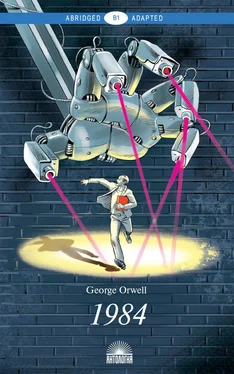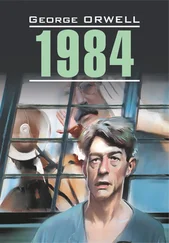One of these days, thought Winston, Syme will be vapourized. He is too intelligent. He sees too clearly and speaks too openly. The Party does not like such people. One day he will disappear. It is written in his face.
Winston had finished his bread and cheese. He turned a little to the side in his chair to drink his mug of coffee. At the table on his left the man was still talking. A young woman was sitting at the same table with her back to Winston and listening to the man. She was perhaps his secretary and seemed to agree with everything that he was saying. From time to time she said «I think you're so right, I do so agree with you». But the other voice never stopped, even when the girl was speaking. Winston had seen the man before. He was a man of about thirty. Winston knew that he held some important post in the Fiction Department, but nothing else. Winston couldn't hear what the man was talking about, he just once caught a phrase – «they should finally destroy Goldsteinism». For the rest it was just a noise, a quack-quack-quacking. And yet, you knew what he was talking about. You could be certain that every word of it was pure orthodoxy, pure Ingsoc. It was not the man's brain that was speaking, it was his throat. What he was saying consisted of words, but it was not speech in the true sense: it was a noise, like the quacking of a duck.
Syme was silent. The voice from the other table quacked, Winston and Syme could hear it in spite of the noise.
«There is a word in Newspeak», said Syme, «I don't know whether you know it: duckspeak, to quack like a duck. It is one of those interesting words that have two opposite meanings. If you say it to your opponent, it is negative, if you say it to someone you agree with, it is positive».
There's no doubt that Syme will be vapourized, Winston thought again. He thought it with a kind of sadness. He knew well that Syme disliked him, and could report him as a thoughtcriminal if he saw any reason for it. There was something wrong with Syme. There was something that he lacked: a sort of saving stupidity. You could not say that he was unorthodox. He believed in the principles of Ingsoc, he respected Big Brother, he hated thought-criminals. Yet there was something wrong with him. He said things that you shouldn't say, he had read too many books, he often went to the Chestnut Tree Café, where painters and musicians went. There was no law against going to the Chestnut Tree Café, yet you knew that you shouldn't. The old leaders of the Party had been used to go there before they were destroyed. Goldstein himself, it was said, had sometimes been seen there, years ago. Winston knew what would happen to Syme. And yet if Syme learnt Winston's secret opinions, he would report him to the Thought Police at once. So would anybody else: but Syme more than most.
Syme looked up. «Here comes Parsons», he said.
Something in the tone of his voice seemed to add, «that fool». Parsons, who lived in the same block of Victory Mansions as Winston, was in fact coming across the room. At thirty-five he was already getting fat at neck and waist. His movements and his whole appearance was that of a little boy grown large. He greeted them both with a happy «Hullo, hullo!» and sat down at the table. Winston and Syme felt a strong smell of sweat. He always sweated a lot. At the Community Centre you could always tell when he had been playing table-tennis, because the bat handle was wet. Syme had taken a strip of paper with a long list of words, and was studying it with an ink-pencil between his fingers.
«Look at him working away in the lunch hour», said Parsons, pushing Winston with his elbow. «What's that you've got there, old boy? Something a bit too clever for me, I expect. Smith, old boy, I'll tell you why I'm here. It's that sub you forgot to give me».
«Which sub is that?» said Winston, looking for money. About a quarter of one's salary had to be given for voluntary subscriptions. There were so many that it was difficult to remember all of them.
«For Hate Week. I'm in charge of our block. We're going to put on a great show. I tell you, it won't be my fault if old Victory Mansions doesn't have the biggest number of flags in the whole street. Two dollars you promised me».
Winston found and gave him two notes, which Parsons put in a small notebook.
«By the way, old boy», he said. «I hear that my little boy hit you with his catapult yesterday. I told him I'd take the catapult away if he does it again».
«I think he was a little upset at not going to the hanging», said Winston.
«Ah, well – troublemakers they are, both of them! All they think about is the Spies, and the war, of course. Do you know what that little girl of mine did last Saturday on a hike? She made two other girls to go with her and spent the whole afternoon following a strange man. They followed him for two hours, right through the woods, and then reported him to the patrols».
«What did they do that for?» said Winston, surprised. Parsons continued:
«My kid made sure he was some kind of enemy spy – might have used a parachute, for instance. But here's the point, old boy. Why do you think she followed? She saw that he was wearing a funny kind of shoes – said she'd never seen anyone wearing shoes like that before. So the chances were he was a foreigner. Pretty smart for a child of seven, eh?»
«What happened to the man?» said Winston.
«Ah, I don't know, of course. But I guess…» Parsons made the motion of aiming a rifle, and clicked his tongue for the explosion.
«Good», said Syme without looking up from his strip of paper.
«Of course we can't risk», agreed Winston.
«What I mean to say, there is a war on», said Parsons.
At this very moment they heard a trumpet call from the telescreen just above their heads. However, it was not news of a military victory this time, but a message from the Ministry of Plenty.
«Comrades!» cried a youthful voice. «Attention, comrades! We have great news for you. We have won the battle for production! The standard of living has risen by 20 percent over the past year. All over Oceania this morning there were demonstrations when workers came out of factories and offices and went through the streets with banners to express their gratitude to Big Brother for our new, happy life. Here are some of the figures…»
The voice repeated the phrase «our new, happy life» several times. The Ministry of Plenty had been using it quite a lot lately. Parsons was listening to the message. He didn't understand the figures, but he knew that they were in some way a reason to be happy. He had taken out a big dirty pipe which was already half full of tobacco. You couldn't fill a pipe to the top with the tobacco ration at 100 grammes a week. Winston was smoking a Victory Cigarette which he held carefully. The new ration did not start till tomorrow and he had only four cigarettes left. For the moment he ignored the noises in the canteen and was listening to the message from the telescreen. There had even been demonstrations to thank Big Brother, because he had raised the chocolate ration to twenty grammes a week. And only yesterday, he thought, it had been announced that the ration would be reduced to twenty grammes a week. Was it possible that they could believe that, after only twenty-four hours? Yes, they believed it. Parsons believed it easily, as stupid as an animal. The man at the other table believed it, he would vapourize anyone who should say that last week the ration had been thirty grammes. Syme, too – in some more complex way, involving doublethink, Syme believed it. Was he, then, the only one who had a memory?
The report from the telescreen continued. This year there was more food, more clothes, more houses, more ships, more helicopters, more books, more babies – more of everything except disease, crime, and insanity. Year by year and minute by minute, everybody and everything was becoming better. Had it always been like this? Had food always tasted like this? He looked round the canteen. The low ceiling, with a lot of people in it, its walls dirty; metal tables and chairs, placed so close together that you sat with elbows touching; bent spoons, dirty trays; and a strong smell of bad gin and bad coffee and stew and dirty clothes. You always had a feeling in your stomach and in your skin that there was something that you had a right to, but didn't get. He couldn't remember anything greatly different. In any time, there had never been quite enough to eat, one had never had socks or underclothes without holes, bread had always been dark-coloured, coffee bad, cigarettes too few – you could only get enough cheap gin. And, of course, it grew worse when you became older. Was it not a sign that this was wrong? Why should one feel one couldn't bear it? Didn't it mean one had some kind of memory that things had once been different?
Читать дальше












